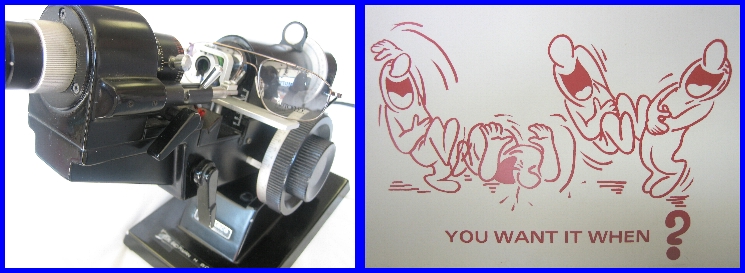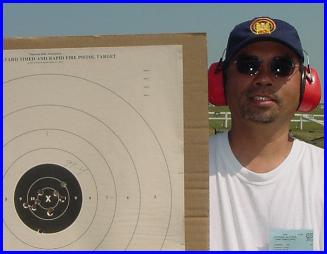

Greetings Shooters,
After communicating with some shooters, I thought that "Inaccuracies with Eyeglass Prescriptions" would be an important topic for bullseye shooters. We've discussed supplements to improve cellular structure in the retina. We've discussed ABBE VALUE which may account for lens distortion in our eyeglasses. We've discussed PRESBYOPIA which affects our iron sight vision. We've discussed pupil size as well.
With all this wealth of information, some of you may still be unsatisfied with your vision, and rightly so. No matter how meticulous your eye examination, if your prescription eyeglass lenses were made poorly, your eyesight will not be optimum.
First, as a review, let us consider the eye exam. As long as you, as the patient, do your part correctly, we can decrease the variables. Do not close the opposite eye while being tested through the phoropter (the machine with all the lenses). Do not squint your eyes when viewing the different lenses. Be sure to look through the center of the phoropter lenses and not drift your line of sight towards the edge. Stop when your eyes are tearing. Let the eye care professional know your medical background and all medications, including over-the-counter medicines. Beware of the eye doctor, no matter how reputable, who uses technicians relying on automated instrumentation for verification of your eyeglasses and for your refraction. (Easier to use for the limited trained but could be inaccurate).
As bullseye shooters, I believe we have more acute needs than the average individual. In the vast majority of eye exams, the doctor checks your eyesight in 0.25 diopter increments. For some of us however, our exact prescription may fall in between these increments and our final prescription may be a rounding off value, and could be 0.125 diopter off. Most patients may not see this difference, but some may. To compound this error, the accepted standard of tolerance by the optical industry is + or - 0.125 diopter of your exact prescription. This is known as the ANSI standard. In other words, your eyeglass lenses may be wrong, but it may be considered "close enough." If the exam was 0.125 diopter off and the lenses were made 0.125 diopter off, then we may be 0.25 diopter in total error at this point, and yet, this scenario is not given a second thought or even contemplated by most people in the eyecare profession.
The optical centers of both lenses must align with our eyes otherwise there will be induced unwanted prism in our prescription. It is possible for the lenses to be misaligned vertically, horizontally or a combination of both. Some may tolerate this prism while others may experience eyestrain and occasional double vision. If you could never adjust to a pair of eyeglasses in the past, don't blame yourself. It just may be poor craftsmanship.
Let us now consider the location of service. "You get what you pay for!" holds true for everything we encounter in day to day life and eyeglasses are no different. With optical locations offering quick turn-around time such as one hour service or one day service, the emphasis is on quickness and not as much on accuracy. With locations offering low prices, the emphasis is on cost and less on accuracy. With lower profit margins, borderline Rx's will probably be given to the patients and not be redone to the exact requirements. In some locations, the lenses are not even verified for accuracy before given to the patient. This is not to say all work is done poorly, only a greater chance. I've seen lenses substituted when the exact power was not in stock. I've also frequently seen the lenses mounted reversed, that is, the right lens on the left side and left lens on the right side. I speak from past experience with the hopes of enlightening my fellow shooters to understand what may happen "behind the scenes" of the bright lights and mirrors of the showroom.
For those of you who think you are getting your proper lens Rx when filling your prescription, you might consider these points I've discussed. Your eyecare professional should be willing to discuss your concerns. My best advice,........ be as critical with your eyewear as you are with your gun's trigger action.
Good Vision and Good Shooting To All,
Norman H. Wong, O.D.
Since the writing of this article, a major optical chain has agreed to settle a multi-million dollar class action law suit because of substituting lens material with a lower quality (price) material and without the patients' knowledge.
